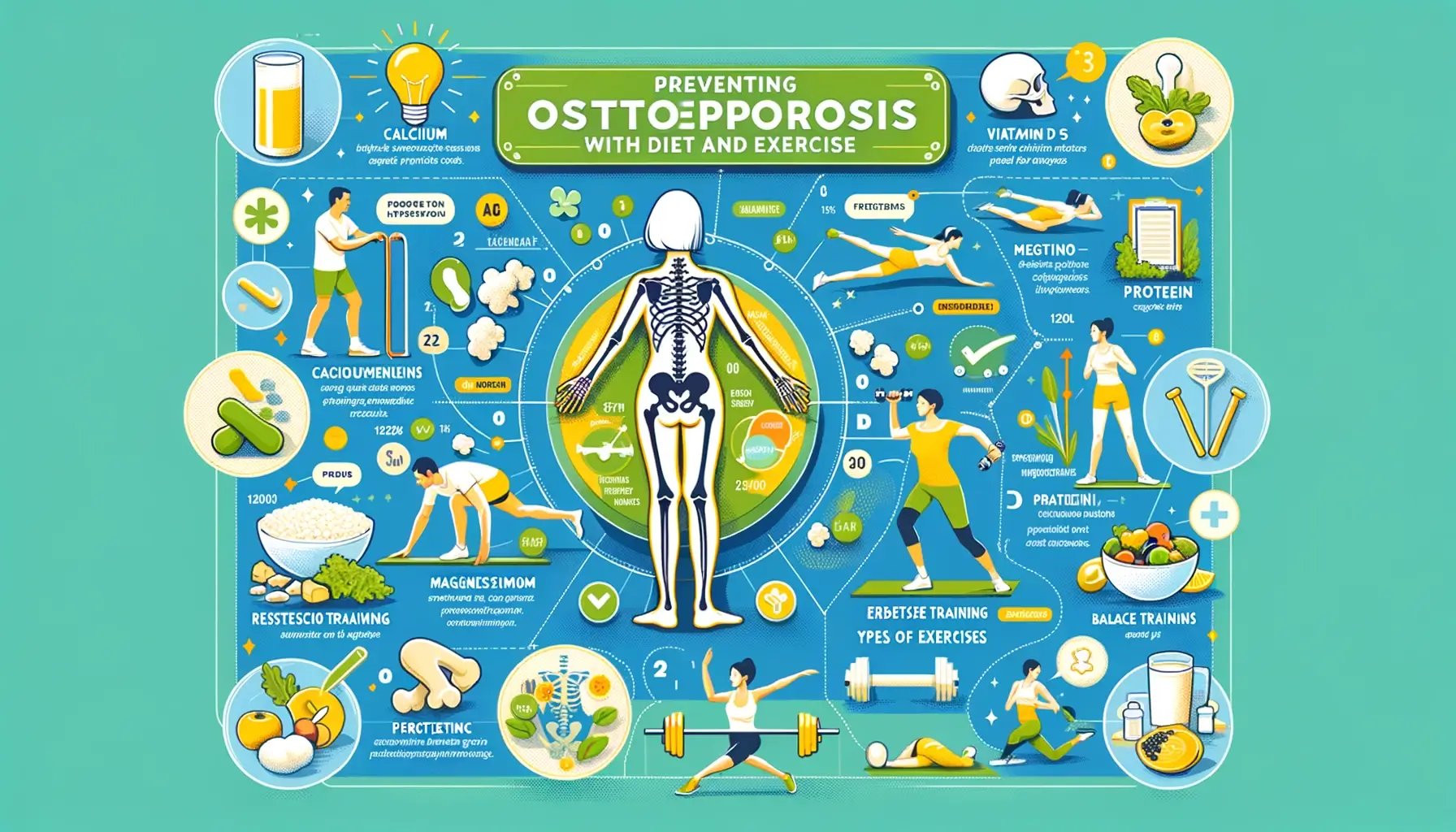Exercise plays a fundamental role in maintaining bone health, and when combined with a balanced diet, it becomes a powerful preventive measure against osteoporosis. This condition weakens bones, making them fragile and more prone to fractures, especially in older adults. By engaging in weight-bearing activities and strength training, individuals can strengthen their bones and reduce the risk of developing this debilitating disease. Additionally, incorporating nutrient-rich foods such as dairy products, leafy greens, and fish into the diet can provide essential minerals like calcium and vitamin D, crucial for building and maintaining strong bones. By understanding the impact of lifestyle choices on bone health, individuals can take proactive steps to preserve their skeletal strength and overall well-being.
Key Takeaways:
- Calcium-rich Diet: Consuming foods high in calcium such as dairy products, leafy greens, and fortified foods can help in preventing osteoporosis.
- Weight-bearing Exercises: Engaging in weight-bearing exercises like walking, running, dancing, or strength training can increase bone density and strength to lower the risk of osteoporosis.
- Vitamin D: Ensuring an adequate intake of vitamin D through sunlight exposure and supplements can help in calcium absorption and bone health.
Foundations of Osteoporotic Prevention

Understanding Bone Health and Physiology
Bone health is a critical component of overall well-being, providing structural support for the body and protecting vital organs. Osteoporosis is a condition characterized by weak and brittle bones, making individuals more susceptible to fractures. Understanding the physiology of bone health is crucial in preventing this debilitating disease. Bones are dynamic organs that are constantly undergoing a process called remodeling, where old bone is broken down and new bone is formed. This balance is maintained by cells known as osteoblasts and osteoclasts.
Factors such as age, genetics, hormonal imbalances, and lifestyle choices can all influence bone density. Regular weight-bearing exercises help to strengthen bones and improve their density. By understanding the intricate processes that govern bone health, individuals can take proactive steps to prevent osteoporosis.
The Impact of Nutrition on Bone Density
Prevention of osteoporosis also involves attention to nutrition, as the foods we consume play a crucial role in bone health. Adequate intake of calcium, vitamin D, and other essential nutrients is vital for maintaining strong and healthy bones. Calcium is a key mineral that provides the structural framework for bones, while vitamin D helps in the absorption of calcium.
With a balanced diet rich in dairy products, leafy greens, nuts, and fortified foods, individuals can support their bone density and reduce the risk of osteoporosis. It is essential to consult with a healthcare provider or a dietitian to ensure that one’s diet meets the necessary requirements for optimal bone health.
Dietary Strategies for Bone Strength
Clearly, a well-rounded diet rich in essential nutrients is crucial for maintaining bone health and preventing osteoporosis. A combination of key nutrients and an overall healthy eating pattern can significantly contribute to skeletal integrity.
Key Nutrients for Bone Health
Bone health is heavily dependent on various key nutrients, including calcium, vitamin D, magnesium, and vitamin K. Calcium is the primary mineral found in bones and is essential for bone structure and strength. Vitamin D is crucial for calcium absorption, while magnesium plays a role in converting vitamin D into its active form. Vitamin K helps regulate calcium in the body and is essential for bone mineralization.
To ensure optimal bone health, it is important to consume adequate amounts of these key nutrients through a balanced diet. Dairy products, leafy greens, nuts, seeds, and fatty fish are excellent sources of these essential nutrients and should be included in your daily meals to support bone strength.
Optimizing Dietary Patterns for Skeletal Integrity
Strength and integrity of bones can be further enhanced by adopting a healthy dietary pattern, such as the Mediterranean diet or DASH (Dietary Approaches to Stop Hypertension) diet. These diets promote the consumption of fruits, vegetables, whole grains, lean proteins, and healthy fats, all of which provide a wealth of nutrients beneficial for bone health.
By following a balanced and nutrient-dense diet that includes a variety of foods rich in calcium, vitamin D, magnesium, and vitamin K, you can significantly reduce your risk of developing osteoporosis and ensure lifelong skeletal health.
Exercise for Enhanced Bone Resilience
The Science Behind Exercise and Bone Density
Density is a crucial factor in determining the strength of our bones. *Strong* bones are essential for overall health and well-being, as they provide structure, support, and protection to our bodies. When we engage in weight-bearing exercises such as walking, running, or lifting weights, we stimulate our bones to become denser and stronger.
Research has shown that physical activity enhances bone density by promoting the growth of new bone tissue and preventing bone loss. *Regular* exercise helps to maintain bone health and reduce the risk of fractures associated with osteoporosis. By putting stress on the bones through *impact* exercises, we signal the body to build more bone cells, increasing bone density over time.
Tailoring Exercise Routines for Osteoporosis Prevention
Routines for osteoporosis prevention should include a mix of weight-bearing, resistance, and flexibility exercises. *Weight-bearing* exercises like walking, jogging, dancing, and hiking are particularly effective in improving bone density. *Resistance* training with weights or resistance bands helps to strengthen muscles and bones. Incorporating *flexibility* exercises such as yoga or Pilates can enhance balance, coordination, and posture, reducing the risk of falls and fractures.
Behind every tailored exercise routine lies the science of biomechanics and physiology. It is crucial to consult with a healthcare provider or a professional trainer to develop a personalized exercise plan that suits your current fitness level, health status, and bone density needs. By carefully selecting and combining different types of exercises, you can create a comprehensive routine that promotes optimal bone health and resilience.
Synthesizing Diet and Exercise into a Cohesive Strategy
Not just focusing on individual aspects like diet or exercise, but rather integrating them into a cohesive strategy is key in preventing osteoporosis. Combining proper nutrition with targeted physical activity can significantly improve bone health and reduce the risk of fractures.

Integrating Nutrition and Physical Activity
Nutrition plays a vital role in building and maintaining strong bones. Consuming an adequate amount of calcium, vitamin D, and protein is essential for bone health. Incorporating dairy products, leafy green vegetables, nuts, seeds, and fortified foods into your diet can provide these essential nutrients. Pairing a well-balanced diet with weight-bearing exercises such as walking, running, or resistance training can further enhance bone density and strength.
Long-term Considerations and Lifestyle Adaptations
Cohesive
Cohesive and long-term approaches to diet and exercise are crucial in preventing osteoporosis. Consistency in maintaining a healthy lifestyle over the years can have a profound impact on bone health. It is important to view diet and exercise not as short-term fixes but as lifelong habits that promote overall well-being.
Adaptations must be made as we age to accommodate changing nutritional needs and physical capabilities. Regularly reassessing and adjusting our diet and exercise routines can help us sustain bone health and mobility in the long run.
Summing up
To wrap things up, maintaining bone health and preventing osteoporosis is crucial for a healthy and active life. Through a balanced diet rich in calcium and vitamin D, coupled with regular weight-bearing exercises, individuals can strengthen their bones and reduce their risk of developing osteoporosis. By making conscious choices in their lifestyle and being proactive in caring for their bone health, individuals can enhance their quality of life and enjoy greater mobility and independence as they age.
FAQ
Q: What is osteoporosis?
A: Osteoporosis is a condition characterized by fragile and weak bones, increasing the risk of fractures.
Q: How does diet affect osteoporosis?
A: A diet rich in calcium, vitamin D, and other nutrients is essential for maintaining strong bones and preventing osteoporosis.
Q: What role does exercise play in preventing osteoporosis?
A: Regular weight-bearing and muscle-strengthening exercises help improve bone density and reduce the risk of osteoporosis.
Q: What are some foods that promote bone health?
A: Foods such as dairy products, leafy greens, fish, and nuts are excellent sources of nutrients beneficial for bone health.
Q: How can I prevent osteoporosis through lifestyle changes?
A: In addition to a balanced diet and regular exercise, avoiding smoking, limiting alcohol intake, and maintaining a healthy weight can help prevent osteoporosis.
